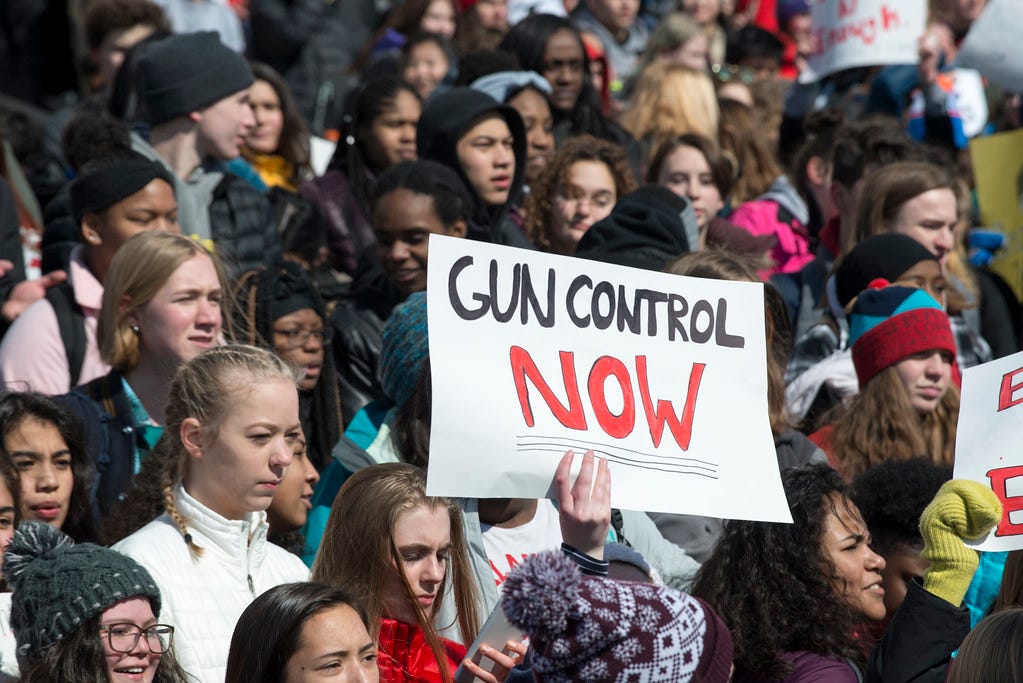OAJ Hot Take: A Milestone for Gun Control as Massachusetts House Passes Landmark Bill
The OAJ is currently looking for interested students to join our team! If you’ve read our work before (or if this is your first time), and you like what we do, please email OAJ Executive Editor Tom Porter at openair@brandeis.edu to join the journal.
The piece below is part of our weekly blog post series written by the Open-Air Journal team where we explore issues at Heller, current events, or whatever is presently on our minds.
On October 18, 2023, in a display of proactive legislative action, the Massachusetts House of Representatives passed Bill H.4135, called “An Act Modernizing Firearm Laws,” by an overwhelming vote of 120-38. Despite Massachusetts having strict gun laws and boasting one of the lowest rates of gun violence in the nation, the importance of maintaining stringent firearm regulations cannot be understated. States with strong gun legislation see lower rates of gun violence. While the state’s proactive approach to gun control has undoubtedly contributed to its low rates of gun violence, Bill H.4135 will continue to address gun violence in the Commonwealth.
Rep. Michael Day, the bill’s original sponsor, made a compelling statement regarding gun violence broadly, asserting that “we are in the midst of a public health crisis, and it is unrelenting.” Rep. Day is right. In the United States, firearms are the leading cause of death for children and teens, the gun homicide rate is 26 times that of other high-income countries, and firearms are the most used weapon in interpersonal violence against women. Rep. Day bashed the insufficiency of offering “thoughts and prayers” in response to gun violence. While some Republican representatives may use this cop-out, the House has taken decisive action.
In a heated debate over the gun bill, both the Gun Owners’ Action League (GOAL) and the Massachusetts Chiefs of Police Association (MCOPA), stood firmly opposed. GOAL voiced concerns that the House manipulated procedures to ensure its passage. After the vote, executive director of GOAL, Jim Wallace, expressed his outrage saying, “All of it goes against us, the lawful people. There’s nothing in there that goes after the criminals.” The Executive Director of MCOPA, Mark Leahy, took it a step further. He said, “The answer lies in the vigorous prosecution of criminals, who have no regard for gun laws, whether old or new.” This is incorrect. The bill clearly states that any firearm surrendered under the statewide surrender program that is reported lost or stolen shall be returned to its lawful owner. The bill also states that any lawful resident 18 or older may submit a licensing application for a long-gun permit.
Despite vocal opposition the pressing need for such legislation remains undeniable. The success of the state’s gun control policies demonstrates that strict regulations make a difference. By upholding present policies and adding to them, Massachusetts has reinforced the importance of putting safety first, setting an example for the nation to follow.
The newly passed House legislation will strengthen existing gun laws. The bill will support the state assault weapons ban, impose restrictions on the locations where firearms can be carried, and take a firmer stance on unregistered firearms through new registration requirements, particularly for those referred to as “ghost guns,” and continues to seek to extend the reach of the state’s “red flag” laws, also known as Extreme Risk Protective Orders (ERPOs).
Strengthening the assault weapons ban and placing limitations on carrying firearms in schools, polling locations, and government buildings all actively reduce gun violence. By cracking down on unregistered “ghost guns,” the bill addresses the concern of rapid increases of untraceable firearms. Tighter regulation can help keep firearms out of the hands of those who are likely to hurt themselves or others. The bill’s expansion of the “red flag” law is also commendable because it enables early intervention in cases involving individuals at risk to themselves and others. ERPOs are based on the longstanding procedure of domestic violence protective orders. Research by Everytown for Gun Safety found an average of 70 women in the US are shot and killed by an intimate partner every month. ERPOs are also a mechanism for family and household members to intervene during a crisis. In many shootings, family members state that they have noticed dangerous behavior before an incident. Everytown reported that nearly 6 out of every 10 gun deaths are suicides. By expanding the “red flag” laws, Massachusetts can reduce the number of gun deaths related to domestic violence as well as suicides.
In 2004, Massachusetts became the first state to implement an impactful electronic instant background check system with fingerprint scanning for gun licenses and purchases. Since then, Massachusetts has received an A- from the Giffords Law Center on the Gun Law Scorecard. For Massachusetts to remain at the forefront of gun control policy, legislators must unite and collaborate effectively. The Massachusetts Senate has an opportunity to pursue meaningful gun control legislation. With the House and Senate leaders unable to reach a consensus on committee assignments earlier this year, the responsibility now falls on the State Senate to chart a clear and decisive path forward. Senate leadership must write a comparable bill that addresses similar concerns to the House. Ultimately, both chambers must collaborate to send a bill to Governor Maura Healey’s desk.
Three weeks before the vote, Ruth Zakarian, the executive director of the Massachusetts Coalition to Prevent Gun Violence (MACOPGV), emphasized the pressing need for urgency. Zakarian said, “We are going to lift up there is urgency, that trauma is happening now, families are experiencing loss now, and communities are experiencing trauma now.” The world has become desensitized to gun violence. Each new tragedy forces communities to start anew and pick up the pieces. The state has a responsibility to enact comprehensive legislation that decreases preventable trauma.





